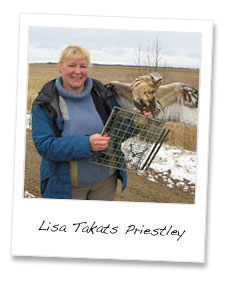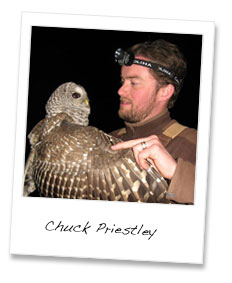About Us
 Lisa Takats Priestley, Tech., M.Sc., PBiol.
Lisa Takats Priestley, Tech., M.Sc., PBiol.
Lisa is a biologist with 17 years of academic and professional work experience. She has worked with federal and provincial governments, non-government organizations, industry, academic (university and college), and environmental consulting companies.Her interest in wildlife ecology and management has guided most of the work she has been involved with. This includes: developing guidelines for monitoring owls, snakes, amphibians and marsh birds; developing long-term monitoring programs for owls, songbirds, and amphibians; wildlife use on military bases, environmental impact assessment of road, power, and transportation development projects; habitat suitability index modeling for a variety of species; bat populations surveys; research and surveys for sensitive and Endangered Species (ie. Peregrine Falcon, Piping Plover, Loggerhead Shrike, Short-eared, Burrowing, and Barred Owl, Prairie Rattlesnake, Northern Leopard Frog, Long-toed Salamander); and public education.
She worked with Alberta Conservation Association for five years developing amphibian and reptile programs, with Bird Studies Canada for two years developing marsh monitoring and a National Owl Survey, and with Beaverhill Bird Observatory for four years as the Executive Director.
Lisa has traveled extensively conducting wildlife research around North America and has attended and presented posters and talks at a variety of international, national, and provincial scientific conferences.
Lisa has a Biological Sciences diploma from NAIT, a BSc. from the University of Alberta in Biological Sciences, and a MSc. in Wildlife Ecology and Management from the same institution.
Her Master’s thesis involved studying the ecology of the Barred Owl in the foothills and developing an HSI model. One of the major accomplishments from her thesis was taking the lead on developing Nocturnal Owl Survey Guidelines for North America.
 Chuck Priestley, M.Sc.
Chuck Priestley, M.Sc.
Chuck is a biologist with 11 years of academic and professional work experience for a variety of industry clients, government agencies, non-government organizations and environmental consulting companies.His interest in ecosystem management lead to his involvement with professional opportunities throughout western Canada, including longterm monitoring programs for songbirds and owls; wildlife habitat use on military bases; environmental impact assessment of road, wind farm, coal mine and oil sand development projects; woodland caribou management in Alberta’s Foothills; habitat suitability index modeling for the Barred Owl; testing the Global Monitoring Protocol for Important Bird Areas; North American movement of Burrowing Owls; bat population surveys; and testing the North American Amphibian Monitoring Program protocol.
As chair of the Beaverhill Bird Observatory for the past seven years, Chuck has helped manage and operate the longest running bird observatory in western Canada. Data obtained by Bird Observatories are contributed to national and continental bird monitoring efforts via the Canadian Migration Monitoring Network and the Monitoring Avian Productivity and Survivorship program.
Chuck has worked as a biologist, environmental educator, grant review committee member, and public speaker with organizations in the non-profit sector such as Alberta Conservation Association, Bird Studies Canada, Federation of Alberta Naturalists, Nature Canada and University of Alberta.
Chuck studied bird movements using radio telemetry, stable isotopes and DNA analyses for his M.Sc., Wildlife Ecology and Management, degree which he attained at the University of Alberta. His B.Sc. was obtained from the same institution in Environmental and Conservation Sciences.
